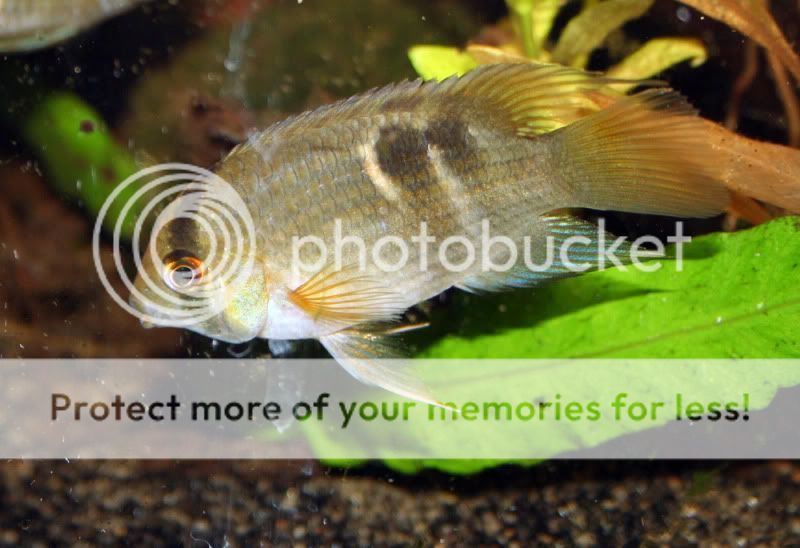Keyhole Cichlid
2 posters
Page 1 of 1
 Keyhole Cichlid
Keyhole Cichlid
Keyhole Cichlid (Cleithracara Maronii)
Family: Cichlidae
Sub Family: Cichlasomatinae
Distribution: South America, primarily found in clear waters with gentle currents.
Tank Set up: Keyholes can be quite shy if they don’t feel secure in their surroundings, so it’s best to try and replicate their natural habitat as much as possible. Dark substrate, plants and bogwood will all help, and some flat stones will also provide potential spawning sites for them.
Providing dither species of fish (such as shoaling tetra, pencil fish, bottom dwellers) will also help their confidence and will increase the amount you see them out and about their tank.
Temperature: 22-27oC (72-81 F)
pH: 6.0-7.5
Sexual Dimorphism: As juveniles, Keyhole cichlids can be difficult to sex as they appear very similar. As they mature, males become slightly bigger with longer dorsal and anal fin extensions.
Breeding: One of the easier cichlids to breed. They can lay hundreds of eggs at a time on a flat surface such as a stone. The eggs will hatch in 3-5 days, and like most cichlids, Keyholes will care for their young.
Notes: A beautiful cichlid that is often over looked for other more colourful fish. Maximum size usually reached in captivity is 12.5cm/5 inches.
These cichlids are a creamy yellow colour and have the distinctive keyhole pattern on its flank, with the fins generally being either blue or yellow. Their colouration can differ quite dramatically if stressed or aggressive, with over all colouration becoming much darker and mottled.
One of the most peaceful cichlids, they make a great addition to a tank with other peaceful inhabitants that share the same water conditions.
Keyholes are usually not fussy eaters and will accept most types of dried and frozen foods. They are naturally omnivorous in the wild and mainly feed on small insects, worms, larvae and crustaceans.
A balanced and varied diet is essential, and can consist of pellets, frozen foods, flakes and small amounts of vegetable matter.

(Better photo to come)
Family: Cichlidae
Sub Family: Cichlasomatinae
Distribution: South America, primarily found in clear waters with gentle currents.
Tank Set up: Keyholes can be quite shy if they don’t feel secure in their surroundings, so it’s best to try and replicate their natural habitat as much as possible. Dark substrate, plants and bogwood will all help, and some flat stones will also provide potential spawning sites for them.
Providing dither species of fish (such as shoaling tetra, pencil fish, bottom dwellers) will also help their confidence and will increase the amount you see them out and about their tank.
Temperature: 22-27oC (72-81 F)
pH: 6.0-7.5
Sexual Dimorphism: As juveniles, Keyhole cichlids can be difficult to sex as they appear very similar. As they mature, males become slightly bigger with longer dorsal and anal fin extensions.
Breeding: One of the easier cichlids to breed. They can lay hundreds of eggs at a time on a flat surface such as a stone. The eggs will hatch in 3-5 days, and like most cichlids, Keyholes will care for their young.
Notes: A beautiful cichlid that is often over looked for other more colourful fish. Maximum size usually reached in captivity is 12.5cm/5 inches.
These cichlids are a creamy yellow colour and have the distinctive keyhole pattern on its flank, with the fins generally being either blue or yellow. Their colouration can differ quite dramatically if stressed or aggressive, with over all colouration becoming much darker and mottled.
One of the most peaceful cichlids, they make a great addition to a tank with other peaceful inhabitants that share the same water conditions.
Keyholes are usually not fussy eaters and will accept most types of dried and frozen foods. They are naturally omnivorous in the wild and mainly feed on small insects, worms, larvae and crustaceans.
A balanced and varied diet is essential, and can consist of pellets, frozen foods, flakes and small amounts of vegetable matter.

(Better photo to come)
Page 1 of 1
Permissions in this forum:
You cannot reply to topics in this forum






